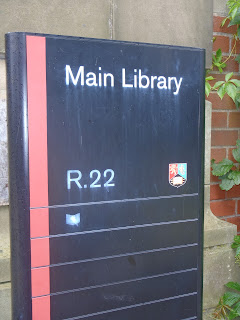 |
| Notice outside the main library, no I did not go in, but I liked the textured and weathered look of it |
I know it is only the last day of July but this supervision was early to take into consideration the holidays and my next supervision is early September.
Right I took my documents to my supervisor this time,
amongst them was a think piece. I do not usually do think pieces at the moment,
but I was struggling with the fact that while I was writing lots of
description, I was not finding it easy to integrate the theory with it. This
struggle was particularly intense with the last chapter where the theorists were
very few and far between. When you say you are having problems finding anyone
to your supervisor and his reply to paraphrase is “Apart from me there isn’t
really anyone” then this is not surprising. I have found a useful writer on
ritual, I can use ritual not directly but I can talk of form, and form in
worship is very closely related to ritual. What is contained within the form is
not always the same even when the form looks the same. So you get within
worship even that that is not hugely ritualistic a binary stars system where form
and understanding circle around each other without being exactly the same.
Anyway I decided to instead start drafting an overview of
the theory of my thesis. That started to get my supervisor excited, so now we
have split the data chapters from the theory chapters and there are three of
each. The three theory chapters mark an outward trajectory that goes from
Tradition, through Belonging and on out to Flows within Identity. Anyone know a
popular book on fluid dynamics that a way out of practice mathematician would
understand? So where I thought I had one chapter to finish and another on
Tradition to write I now have that chapter signed off (the change actually
means that apart from a drawing together of threads that chapter is fully
written). I also have a major selection job to do as I need to reduce my chapters
down but I know now how to and writing my theory gives me the tools to cut it
down effectively. Actually I pretty confident that I can write the chapter on
tradition pretty quickly, maybe by next supervision, the chapter on belonging
may well take longer though I think that is pretty straightforward to, which
means the big challenge is the chapter on flow. This will need to bring
together the various strands of the thesis and create an understanding what the
whole thesis is.
Yes I am happy with this, a lot more happy than I was with
the previous structure as it allows the descriptive analysis to appear in its
own right although more selected rather than letting the theoretical discourse
shape the whole thing.
Otherwise two unusual things happened today, it actually rained on me while I was in Birmingham, this is a big rarity, even on wet days I seem to dodge the showers and the wet days have been the minority. The other is even more surprising, I as usual booked a seat on the train but only yesterday and not only did I get a seat but a table seat and facing the direction of travel. For once the 5:00 pm train does not have every seat foll on leaving Birmingham (usually very few standing but all seats full).





